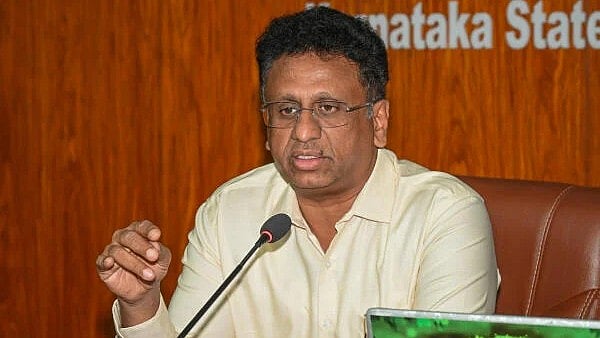
Higher Education Minister Dr M C Sudhakar
Credit: DH Photo/ S K Dinesh
Mangaluru: Minister for Higher Education Dr M C Sudhakar said that the Karnataka government will receive financial assistance of Rs 2,500 crore from the Asian Development Bank (ADB) to upgrade technical and higher education institutions across the state.
“With this funding, we will establish 40 first-grade colleges and 10 polytechnics as model institutions. In addition, nine Centres of Excellence will be set up within the next four years,” he said.
He was speaking at the 25th Triennial Conference 2025 of the Xavier Board of Higher Education in India on the theme ‘Empowering Minds, Embracing Change: Reimagining Higher Education for a Global Tomorrow’, organised at St Aloysius (Deemed-to-be University), Mangaluru.
Dr Sudhakar said greater emphasis would be laid on skill development and ensuring that every course is engaging and employment-oriented. “A dynamic curriculum with better facilities will be introduced, focusing on aptitude, communication skills, problem-solving, and critical thinking among students. The ADB team is working closely with the state government, and we are open to the suggestions they provide,” he added.
The minister emphasised that the true success of education lies in nurturing students to become compassionate citizens. He also stressed the need to uphold the secular fabric of the country and adopt innovative models that enable India to emerge as a leader in higher education.
“Empowering minds is a crucial aspect of higher education. We live in an era of rapid technological advancement. To truly empower minds, we must go beyond imparting knowledge — we must instil courage and critical thinking, enabling students not only to adapt to the world as it is, but also to imagine and build the world as it should be. Education liberates the mind from fear,” he said.
“For the higher education of the future, we must focus on three key pillars — relevance, innovation, and global responsibility,” he added. Dr Sudhakar said the government is focusing on skill-based and experiential learning.
On the entry of foreign universities into Karnataka, he said their presence would push private universities in the state to compete by offering world-class degrees domestically, thereby reducing the need for students to go abroad. “This development will encourage our private universities to match international curricula, pedagogy, and standards of education. This is a big change we look forward to in Karnataka,” he noted.
He said Lancaster University would become the second foreign university to establish a campus in Karnataka next year. The University of Liverpool has already signed an agreement with the state government, while Imperial College London has opened its research centre, with more institutions in the pipeline.
To empower female students, the state government has partnered with the Azim Premji Foundation to launch a scholarship programme providing financial support to around 37,000 girls pursuing higher education, with plans to expand if the numbers exceed expectations.
“We have also launched the Chevening–Karnataka Scholarship to help students pursue master’s degrees in the UK. Additionally, the Karnataka State Higher Education Council (KSHEC) and the British Council have introduced the Scholars for Outstanding Undergraduate Talent (SCOUT) programme, which provides talented students from state institutions with international exposure, focusing on themes such as Sustainable Development Goals, critical thinking, and entrepreneurship,” he said.